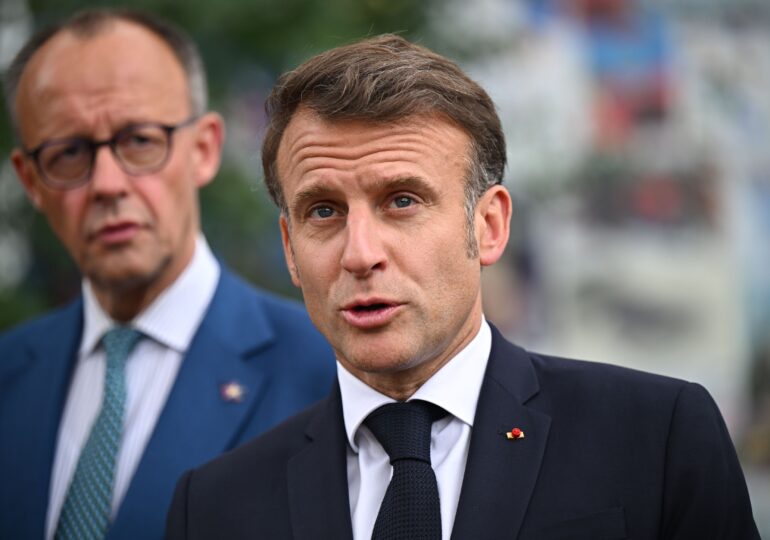The leaders of France, Germany, and Poland are meeting on Wednesday in the small Republic of Moldova to urge voters to continue distancing themselves from Russia and to support their country’s pro-EU government.
Moldova’s President, Maia Sandu, and her governing party, the Party of Action and Solidarity (PAS), are facing critical parliamentary elections on September 28 amid warnings that Moscow is attempting to influence the outcome and thwart the country’s efforts to join the EU, Politico writes.
"There are those who will try to lead us astray from the right path. They have tried before... But the Moldovan people know what is best for them," Maia Sandu is expected to say at a rally held on the country's Independence Day.
"For our country, the best choice is to stand alongside France, Germany, Poland, and the other nations of our continent in the great family of peace - the European Union," the head of state will emphasize.
A country with 2.4 million inhabitants, situated between Romania and Ukraine, Moldova has become a target of Russian leader Vladimir Putin. While Moscow wages a physical war to subjugate Ukraine, it uses hybrid tactics to try to control Moldova, including widespread manipulation of voters during elections, Politico notes.
This week's visit by French President Emmanuel Macron, German Chancellor Friedrich Merz, and Polish Prime Minister Donald Tusk aims to help Moldova stay on the path to EU accession and remind voters that there is an alternative to Russia.
"This is not just a visit, but a living connection between Europe and the Moldovan people," said Jürgen Hardt, the foreign policy spokesman for the ruling CDU party in Germany. "None of our allies will be left alone in the face of Russian aggression," reassured the CDU official.
Nicu Popescu: Every vote will count
Last year, Maia Sandu secured a second term with a very narrow margin following elections marked by electoral fraud, including a scheme where voters were paid to support her pro-Kremlin opponents.
A simultaneous referendum on EU accession was approved by an extremely narrow margin, 50.4% to 49.6%.
In both cases, the votes of the 250,000 Moldovans living abroad, many of them in EU countries, were a key pillar of support for the liberal government.
Earlier this month, Moldova's national security adviser, Stanislav Secrieru, warned of growing concerns about disinformation targeting the diaspora and even possible disruptions at polling stations abroad.
"Under normal circumstances, this election campaign should be very favorable to the current candidates. Opinion polls show that at present, we would have almost a majority," said Nicu Popescu, former Deputy Prime Minister of Moldova, running for a seat in Parliament on behalf of PAS.
"But, of course, there are hybrid attacks, there are non-digital aggressions, Russia illegally introduces millions and millions, cash, to buy votes on a very large scale. So, while I am confident, every vote will count," emphasized the former foreign minister.
In Chisinau, Merz, Macron, and Tusk will aim to convey to Moldovan voters that the future of their country lies in the EU.
Their presence "sends a strong message - Moldova is not alone," said Siegfried Mureșan, Romanian MEP and president of the EP delegation for relations with the country. "Its European path is real, irreversible, and supported by all major political families in the EU," Mureșan emphasized.
Changed dynamics
However, the exact timing of Moldova's accession to the EU - and a crucial step known as opening a "negotiation cluster" - remains controversial.
Earlier this summer, EU officials and diplomats told Politico that the European bloc is considering accelerating Moldova's accession process by opening a negotiation cluster before the elections to boost the pro-EU camp.
However, Ukraine and many of its allies strongly oppose such a move. And the fact that US President Donald Trump persuaded Hungarian Prime Minister Viktor Orbán - who opposes Ukraine's accession to the EU but indicated support for Moldova's accession - to drop the blockade on Ukraine's accession to the EU has changed the dynamics, a diplomat quoted by Politico said.
"It is understandable that some want to offer Moldova a negotiation cluster, but doing so because elections are approaching would be an ill-considered and ultimately counterproductive move," the diplomat said. "Other countries are watching us," he added.
"There are merits for both Ukraine's and Moldova's candidacies, given the current situation in Ukraine. Decisions in Brussels must be unanimous, and we must act in accordance with these principles," said a French official. Decisions will be made in the "coming days or weeks," the official added.
Two diplomats also expressed hope that the deadlock over Ukraine's accession could be overcome in the coming months, given the pressure on Budapest.
Tusk's presence from Poland, whose country joined the EU in 2004, is particularly significant.
As a former member of the Warsaw Pact, which has since enjoyed a remarkable rise to prosperity, Poland stands out as an example for Moldova regarding the benefits of EU accession.
According to Nicu Popescu, former Foreign Minister, European countries have their own reasons to care about the outcome. "If Russia succeeds in Ukraine and Moldova, it will pose a direct military threat to countries like Romania and Poland - and people understand the stakes. That's why we have this signal of support showing that Moldova matters," he explained.

